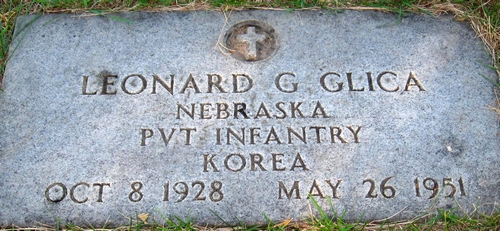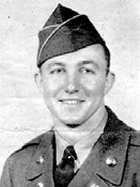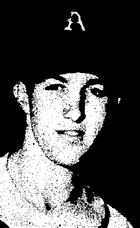Len Glica
| Date and Place of Birth: | October 8, 1928 Omaha, NE |
| Date and Place of Death: | May 26, 1951 Sanghongjong-ni, Korea |
| Baseball Experience: | Minor League |
| Position: | Shortstop/Second Base |
| Rank: | Private |
| Military Unit: | 21st Infantry Regiment, 24th Infantry Division US Army |
| Area Served: | Korea |
Leonard G. “Len” Glica, the son of Henry and Caroline Glica, was born in Omaha, Nebraska on October 8,
1928. He played baseball at South High School in Omaha and signed with
the Brooklyn Dodgers organization following graduation in 1947.
The right-handed hitting shortstop-second baseman was assigned to the
Abilene Blue Sox of the Class C West Texas-New Mexico League where he
batted .252 his rookie year with eight home runs. In September, after
the regular season had finished and he was back home in Omaha, Glica was
recruited to play for the Omaha Pros against the Satchel Paige All-Stars
at American legion Field in Council Bluffs, Iowa. The Pros beat Paige’s
All-Stars, 4-3, in 12 innings. Glica, playing second base, was 1-for-5
against Paige and Larry Napoleon.
Back with the Blue Sox in 1948, Glica spent spring training at Vero
Beach, Florida, under the watchful eyes of such Brooklyn tutors as
Fresco Thompson, Andy High, George Sisler and Pepper Martin. He batted
.259 with 81 RBIs during the season and proved to be a fan favourite for
his all-out style of play.
Glica was advanced to the Newport News Dodgers of the Class B Piedmont
League in 1949. After playing 10 games and batting .258, he joined the
Lancaster Red Roses of the Class B Interstate League, batting .261 in
126 games with six home runs. He remained with the Red Roses in 1950 and
batted .253 with a career-high 10 home runs. On July 9 he had led
Lancaster’s hit parade against the Hagerstown Braves with successive
home runs in the
third and fifth innings and a double in the sixth for his three for
five, as the Red Roses walloped the Braves, 17-3.
"If I can't make the majors or high minors I would like to play out my
string in pro baseball with Abilene," he confided to his friends in
Omaha. "They play good ball down there and treat the players like
heroes."
But Glica never had the opportunity to return to Abilene. He entered
military service on November 30, 1950. Serving as a private with the
21st Infantry Regiment, 24th Infantry Division in Korea, he was killed
in action on May 26, 1951 at Sanghongjong-ni, just four days after
arriving in the war zone.
"Of the players whom I had the pleasure of associating with during my
three years with the Abilene club,” Howard L. Green, former GM of the
Blue Sox told the Abilene Reporter News after hearing of Glica’s death,
“Len Glica and Joe Konitzki stand out as all-time favorites, not because
of their playing talents altogether, but because of their character and
devotion to the game of baseball. Both of them joined us during the 1947
season when the club was hopelessly out of the race but they hustled
every inning as if a World Series were at stake. It was spirit like that
which enabled us to average 1,200 [spectators per game] during the last
three weeks of the season with nothing more to lure the customers than
the promise of a ball game.
"Many of us thought they were headed for the majors. Joe may make it
yet. He is now on the NDS list of the Minneapolis club in the American
Association, having been drafted from the Dodger organization by the
Giants [Konitzki peaked with 7 games for Minneapolis in 1950].
"If Len Glica isn't the first professional ball player killed in the
Korean fighting, he is one of the first [he was, in fact, the second]. I
think that the least that the Abilene club and their legion of wonderful
supporters could do would be to set aside a night to the memory of Len
Glica and to erect a memorial in the Abilene park in tribute to one of
the finest competitors that ever represented Abilene in any sport. His
life has ended far ahead of schedule, not through any fault of his, but
the game of baseball will go on because of fellows like him who are
called upon to fight so that we at home may continue to play.”
Len Glica is buried at Saint Johns Cemetery in Bellevue, Nebraska.

Private Leonard G. Glica's grave at Saint Johns Cemetery in Bellevue, Nebraska
Sources
Council Bluffs Iowa Nonpareil Sept 21, 1947
Council Bluffs Iowa Nonpareil Sept 27, 1947
Lubbock Morning Avalanche April 20, 1948
Hagerstown Evening Journal July 5, 1948
Abilene Reporter News Sept 12, 1948
Hagerstown Daily Mail July 10, 1950
Abilene Reporter News July 17, 1951
Abilene Reporter News July 27, 1951
www.25thida.org
www.find-a-grave.com
Date Added July 22, 2012 Updated July 11, 2013
Baseball's Greatest Sacrifice is associated with Baseball Almanac
Baseball's Greatest Sacrifice is proud to be sponsored by




